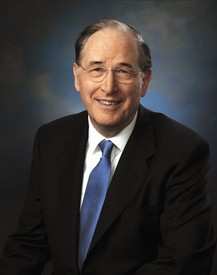Says Benefits Of Previous Mergers Have Not Been Realized By Airline Passengers
In his opening remarks at a hearing of the U.S. Senate Subcommittee on Aviation Operations, Safety, and Security on the US Airways-American merger, Senate Commerce Committee Chairman John D. (Jay) Rockefeller IV said he has concerns about the pending merger between US Airways and American Airlines as the latter company emerges from bankruptcy.

"The last decade has seen the U.S. airline industry go through a dramatic restructuring," Rockefeller (pictured) said in his opening remarks. "Today, we examine the latest chapter in this story – the proposed merger of American Airlines and US Airways into the nation’s largest airline."
Rockefeller said that he knows no industry sector could sustain year after year of multi-billion dollar losses. "Although more carriers often meant more options for travelers, a weak and unstable industry was bad for our economy, our communities, passengers, and airline employees," he said. "The question before us today is whether this latest, and perhaps final, round of consolidation will bring the long sought stability and the benefits that come with it – or whether instead it will bring fewer choices and higher fares for consumers."
Rockefeller said the process to achieving a stable airline industry has been difficult. "So I want to be clear," he said, "restructuring in the case of the American-US Airways merger, and many others, is a euphemism for bankruptcy proceedings. Restructuring using the bankruptcy process may allow these companies to survive but we cannot forget that this is a painful and difficult process with real costs to society.
"No one knows this better than airline employees who have been battered by merger after merger. They have lost jobs, wages, benefits, and, in many cases, their pensions. Customer service has suffered. Routes have been cut to small and rural communities leaving them with fewer choices or worse - no service at all. Had the Essential Air Service program not been in place to replace discontinued air service, many communities over the last several years would have lost air service all together."

The committee chairman said that while shareholders of the companies have paid the price for a healthy airline industry, now everyone – not just shareholders – needs to benefit from today’s smaller, leaner, more efficient, and profitable industry. "The advantages of previous consolidations have not yet been passed on to consumers. They are facing higher fares, crowded and often smaller, less comfortable planes, and fees for every conceivable service," he said. "The industry has become profitable and devised new revenue sources, yet it still ranks at the bottom of customer satisfaction services. Passengers who pay the taxes to run the aviation system deserve far better service than they are currently receiving.
"I also do not believe that, in particular, a healthier industry has improved small and rural air service. Other airline CEOs have repeatedly promised that merging their airlines would lead to more choices for travelers in small and rural communities. I have found that not to be the case, at least in West Virginia, and I know many of my colleagues have shared the same experiences with rural service."
Rockefeller said that he has supported previous airline consolidation because he thought it was necessary for the health of the industry. "I am still waiting, though, to see the lasting benefits of previous mergers. As we evaluate this proposed merger, we must make sure that the advantages of a strong aviation sector benefit more than just shareholders. They must benefit the passengers who deserve more choices and better service for the ticket prices they pay."
 Aero-News: Quote of the Day (12.11.25)
Aero-News: Quote of the Day (12.11.25) ANN's Daily Aero-Term (12.11.25): Nonradar Arrival
ANN's Daily Aero-Term (12.11.25): Nonradar Arrival Classic Aero-TV: David Uhl and the Lofty Art of Aircraft Portraiture
Classic Aero-TV: David Uhl and the Lofty Art of Aircraft Portraiture Airborne-NextGen 12.09.25: Amazon Crash, China Rocket Accident, UAV Black Hawk
Airborne-NextGen 12.09.25: Amazon Crash, China Rocket Accident, UAV Black Hawk Airborne 12.05.25: Thunderbird Ejects, Lost Air india 737, Dynon Update
Airborne 12.05.25: Thunderbird Ejects, Lost Air india 737, Dynon Update




